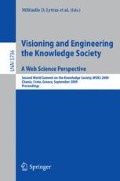Abstract
In recent years, governments and educational institutions have increased their interest in enhancing and expanding pre-school programs and services. In order to achieve a high-quality education, governments have developed several national frameworks. A careful activity planning and the provision of a personalized learning experience are key factors of these programs. In this paper, we present the main design guidelines of an ICT-based tool that supports the tracking and assessment of a child’s development, as well as the recommendation and planning of new learning activities. We also propose a semantic description of the domain based on e-learning standards and specifications. Use of semantic technologies enhances aspects as tools interoperability, processes automation as well as the relevance and precision of the recommendations made by the system. Besides, this tool creates a virtual common framework that encourages collaboration between families and practitioners and it supports parents’ involvement in early care settings.
Access this chapter
Tax calculation will be finalised at checkout
Purchases are for personal use only
Preview
Unable to display preview. Download preview PDF.
References
OECD: Starting Strong II: Early Childhood Education and Care. Technical Report (2006)
Wylie, C., Hodgen, E., Ferral, H., Thompson, J.: Contributions of Early Childhood Education to Age-14 Perfomance. New Zealand Council for Educational Research (2006)
Department for Children, Schools and Families: The Impact of Parental Involvement on Children’s Education. Technical Report (2008)
Learning and Teaching Scotland. A Curriculum Framework for Children 3 to 5. Technical Report (1999)
Siraj-Blatchford, I., Siraj-Blatchford, J.: More than Computers: Information and Communication Technology in the Early Years. The British Association for Early Childhood Education, London (2003)
O’Hara, M.: ICT in the Early Years. Continuum, London (2004)
Lee, L., O’Rourke, M.: Information and Communication Technologies: Transforming Views of Literacies in Early Childhood Settings. Early Years 26(1), 49–62 (2006)
Plowman, L., Stephen, C.: Technologies and Learning in Pre-School Education. American Educational Research Association Conf. (2006)
Delors, J., et al.: Learning: The Treasure Within. UNESCO (1998)
Walldén, S., Soronen, A.: Edutainment. From Television and Computers to Digital Television. University of Tampere Hypermedia Laboratory (2008)
Qualifications and Curriculum Authority: Early Years Foundation Stage. Profile Handbook (2008)
Department for Children, Schools and Families: Practice Guidance for the Early Years Foundation Stage. Technical Report (2008)
Anido, L., Míguez, R., Santos, J.M.: Computers and Advanced Technology in Early Childhood Education. CATE 2008 (2008)
McGuinness, D.L., van Harmelen, F.: OWL Web Ontology Language Overview. W3C Recommendation (2004)
Fernández, M., Gómez, A., Sierra, A.: Building a Chemical Ontology Using Methontology and the Ontology Design Environment. Intelligent Systems 14, 37–45 (1999)
Anido, L., Rodríguez, J., Caeiro, M., Santos, J.: Observing standards for web-based learning from the web. In: Laganá, A., Gavrilova, M.L., Kumar, V., Mun, Y., Tan, C.J.K., Gervasi, O. (eds.) ICCSA 2004. LNCS, vol. 3044, pp. 922–931. Springer, Heidelberg (2004)
Horrocks, I., Patel-Schneider, P.F., Boley, H., Tabet, S., Grosof, B., Dean, M.: SWRL: A Semantic Web Rule Language Combining OWL and RuleML. W3C Member Submission (2004)
E-Framework, http://www.e-framework.org
SIFA: SIF. Implementation Specification 2.2 (2008)
Author information
Authors and Affiliations
Editor information
Editors and Affiliations
Rights and permissions
Copyright information
© 2009 Springer-Verlag Berlin Heidelberg
About this paper
Cite this paper
Miguez, R., Santos, J.M., Anido, L. (2009). Semantic-Based Tool to Support Assessment and Planning in Early Care Settings. In: Lytras, M.D., et al. Visioning and Engineering the Knowledge Society. A Web Science Perspective. WSKS 2009. Lecture Notes in Computer Science(), vol 5736. Springer, Berlin, Heidelberg. https://doi.org/10.1007/978-3-642-04754-1_23
Download citation
DOI: https://doi.org/10.1007/978-3-642-04754-1_23
Publisher Name: Springer, Berlin, Heidelberg
Print ISBN: 978-3-642-04753-4
Online ISBN: 978-3-642-04754-1
eBook Packages: Computer ScienceComputer Science (R0)

